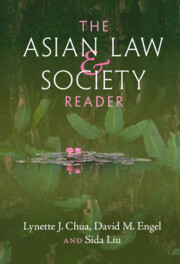Book contents
- Reviews
- The Asian Law and Society Reader
- The Asian Law and Society Reader
- Copyright page
- Dedication
- Contents
- Detailed Table of Contents
- Acknowledgments
- Publisher’s Acknowledgments
- Introduction
- 1 Religion
- 2 Legal Pluralism
- 3 Disputing
- 4 Legal Consciousness
- 5 Legal Mobilization
- 6 Legal Professions
- 7 Courts
- 8 Crime and Justice
- 9 Practicing Law and Society Scholarship in Asia
- Index
- References
2 - Legal Pluralism
Published online by Cambridge University Press: 02 March 2023
- Reviews
- The Asian Law and Society Reader
- The Asian Law and Society Reader
- Copyright page
- Dedication
- Contents
- Detailed Table of Contents
- Acknowledgments
- Publisher’s Acknowledgments
- Introduction
- 1 Religion
- 2 Legal Pluralism
- 3 Disputing
- 4 Legal Consciousness
- 5 Legal Mobilization
- 6 Legal Professions
- 7 Courts
- 8 Crime and Justice
- 9 Practicing Law and Society Scholarship in Asia
- Index
- References
Summary
Legal pluralism studies of Asian law and society are of three types. Some law and society scholars rely on the concept of legal pluralism to theorize official law in relation to various other legal orders operating in the same space. Legal pluralism provides them with a means to describe each of the multiple systems of law and to consider the ways in which they interact with one another. Other law and society scholars, adopting a more state-centric perspective, have studied how different Asian governments address the plurality of legal orders familiar to different population groups or different sectors of social life—such as the family, land, and property; labor and employment; or religious affairs. They show how Asian states—colonial and postcolonial—use legal pluralism to legitimate and extend their power over Asia’s diverse peoples. For a third group of law and society scholars, legal pluralism provides a framework for their “bottom up” research on law in everyday life. They show how individuals pick and choose among various legal orders as they deal with disputes, family matters, economic and social exchanges, claims to land and water, and other matters.
- Type
- Chapter
- Information
- The Asian Law and Society Reader , pp. 74 - 113Publisher: Cambridge University PressPrint publication year: 2023

